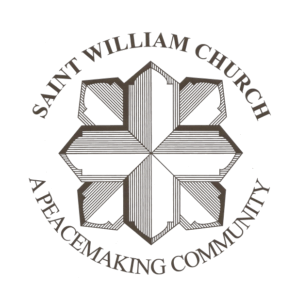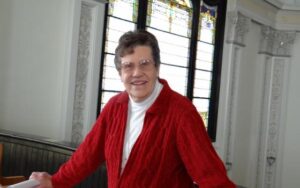Beloved of God

Greetings friends,
This past week I was on retreat at Eastern Point Retreat House north of Boston and I couldn’t help but be constantly reminded by God of the great privilege it is to be a part of growing the conversation about women and the diaconate with each of you.
One morning the sunrise was as splendid as they all are. This one particularly spectacular, because it occurred late enough in the autumn that I was awake without effort to see it. All the senses are heightened. The smell of the salt air and the taste of it on one’s lips. The majesty of the waves combined with the shocking cool of their spray on your face is enough to make you burst out in laughter with the reality of how powerless you are, and how powerful God is. The silence is a paradox. Although speaking is forbidden, humans, birds, wind, machines, your own footsteps and the thoughts inside your head are noisy. The pitch of silence is deafening.
After breakfast, I prayed the rosary in front of a radiant statue of Our Lady. Her face was bright and young, still bearing the wonder of the newly anointed. She held the infant Jesus in her arms. He looked into her face as if she had the answer to every question He might ever have. The mystery of the nature of the incarnation – this innocent child, hidden Son of God, entrusted to the feminine and vulnerable.
Inhale, contract your diaphragm, ‘Hail Mary, full of grace the Lord is with thee.’ Exhale. ‘Blessed are you among women.’ Inhale, ‘And blessed is the fruit of thy womb Jesus.’ Exhale. ‘Holy Mary, Mother of God’. Inhale ‘Pray for us sinners.’ Exhale ‘Now and at the hour of death. Amen.’
Praying the rosary this way slows my prayer and reminds me that as God was made flesh inside the body of a chosen woman, mine too is holy. My inhales are invitations to the Spirit and my exhales are offerings to the world. The power of the Holy Spirit gave Mary the ability to give life. So too with me. Mary’s body was home to Christ Himself. As is mine.
Later, I sit on the edge of the ocean (like a dutiful student) having been instructed by my Spiritual Director to enter into the Gospel stories of Jesus’ Baptism. I imagine the average diver into the pool of Ignatian contemplation places themselves as experiencing their own baptism in this scene. I imagine they are able to feel the strength and roughness in John the Baptizer’s worn hands. I imagine they feel the cool of the Jordan River from the waist down, and are surprised by the warmth of water once submerged under. Into death. Into new life. The darkness and holy isolation that exists under the water for that brief moment. That moment resembles the dawn of creation, when the Spirit hovers over the water. Was it a second, or was it an eternity? At the hands of a slightly mad man, perhaps there is a moment of terror that he won’t permit reentry into the world of the breathing. And the release of anxiety proved wrong as his arms hoist a defenseless body back into the world. A world that remains completely unchanged when in fact everything is changed in the blink of an eye.
I cannot in earnest say that I can place myself in that scene. The voice of one crying out in the wilderness baptized a multitude, and we must assume a portion of that multitude was female. Unnamed but female. There was never a time in our Church’s history when women weren’t permitted to receive the Sacrament of Baptism. There was even a significant time in our Churches history when women were permitted to be conduits of it, even in non-urgent situations. Women were deacons. The hands of mothers and grandmothers stood in place of those of John the Baptist for eleven centuries. What would that have felt like? To tip your head back, into the hands and arms of a strong and trustworthy woman? A woman guiding you into the reality of new birth through the grace of that sacrament? A life giver, exceeding even her own abilities to give life.
The baptismal call for women is like a puzzle that doesn’t have all its pieces. Priest, Prophet, King. Somehow comprehending the reality of one’s baptism is more difficult when the language doesn’t fit. When women possess fewer positions of influence in the Church than they once did. Less access to the grace that exists in all of the sacraments. When their names aren’t written. When paradigms of faith and liturgy and ritual and Word are rooted in the male experience it becomes harder to envision oneself as Beloved of God. And when it is harder to envision yourself as Beloved of God, then it is harder to speak the truth that you are; to the world and to yourself.
We’ve arrived at a moment in history that has the potential to change the way women see themselves in the eyes of God. It is a moment that holds in its hands the power to sharpen the lens through which we see the Church, its role, its structure, and indeed its very suitability to be the Bride of Christ. And we get to be alive in this moment! The waves are crashing against the shoreline reminding us that God is sovereign. God appointed each of us to be alive in this moment in history. What a remarkable grace. How will we respond to that grace?
Kelly Meraw
Director of Collaborative Pastoral Care/ Director of Music and Liturgy
St. John the Evangelist Parish, Wellesley, Massachusetts, USA


